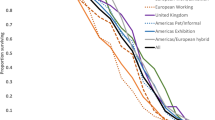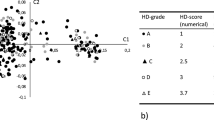Abstract
Canine polygenic obesity can be influenced by relatively recent mutations with large effects. We determined whether, as with monogenic diseases, long autozygous tracts may be disproportionately likely to harbor detrimental variants for additive polygenic obesity in Labrador retriever dogs. Both our detection of runs of homozygosity (ROH) and our preliminary association study were based on whole-genome sequencing of 28 obese and 22 healthy dogs. We detected and analyzed the distribution of 19,655 ROH. We observed 237 and 98 ROH-harboring genotypes associated with obesity and increased body mass, respectively. We found no evidence that long ROH tend to harbor genotypes linked to obesity or increased body weight, and we concluded that data on ROH overlapping GWAS signals for canine obesity are unlikely to help prioritize candidate genes for validation studies.

Similar content being viewed by others
Data availability
FASTQ files were submitted to the European Nucleotide Archive: study accession number PRJEB47658.
Code availability
Not applicable.
References
Babu SR, Bao F, Roberts CM, Martin AK, Gowan K, Eisenbarth GS, Fain PR (2003) Caspase 7 is a positional candidate gene for IDDM 17 in a. Ann NY Acad Sci 1005:340–343. https://doi.org/10.1196/annals.1288.054
Courcier EA, Thomson RM, Mellor DJ, Yam PS (2010) An epidemiological study of environmental factors associated with canine obesity. J Small Anim Pract 51(7):362–367
Fellinger P, Fuchs D, Wolf P, Heinze G, Luger A, Krebs M, Winhofer Y (2019) Overweight and obesity in type 1 diabetes equal those of the general population. Wien Klin Wochenschr 131:55–60. https://doi.org/10.1007/s00508-018-1434-9
Kendler KS, Neale MC (2010) Endophenotype: a conceptual analysis. Mol Psychiatry 15:789–797. https://doi.org/10.1038/mp.2010
Larsen SJ, doCanto LM, Rogatto SR, Baumbach J (2018) CoNVaQ: a web tool for copy number variation-based association studies. BMC Genomics 19:369. https://doi.org/10.1186/s12864-018-4732-8
Lencz T, Lambert C, DeRosse P, Burdick KE, Morgan TV, Kane JM, Kucherlapati R, Malhotra AK (2007) Runs of homozygosity reveal highly penetrant recessive loci in schizophrenia. Proc Natl Acad Sci USA 104:19942–19947. https://doi.org/10.1073/pnas.0710021104
Mankowska M, Stachowiak M, Graczyk A, Ciazynska P, Gogulski M, Nizanski W, Switonski M (2016) Sequence analysis of three canine adipokine genes revealed an association between TNF polymorphisms and obesity in Labrador dogs. Anim Genet 47(2):245–249. https://doi.org/10.1111/age.12390
Mankowska M, Krzeminska P, Graczyk M, Switonski M (2017) Confirmation that a deletion in the POMC gene is associated with body weight of Labrador Retriever dogs. Res Vet Sci 112:116–118. https://doi.org/10.1016/j.rvsc.2017.02.014
Mawby DI, Bartges JW, d’Avignon A, Laflamme DP, Moyers TD, Cottrell T (2004) Comparison of various methods for estimating body fat in dogs. J Am Anim Hosp Assoc 40(2):109–114. https://doi.org/10.5326/0400109
Meyermans R, Gorssen W, Buys N, Janssens S (2020) How to study runs of homozygosity using PLINK? A guide for analyzing medium density SNP data in livestock and pet species. BMC Genomics 21:94. https://doi.org/10.1186/s12864-020-6463-x
Purcell S, Neale B, Todd-Brown K, Thomas L, Ferreira MAR, Bender D, Maller J, Sklar P, de Bakker PIW, Daly MJ, Sham PC (2007) PLINK: a toolset for whole-genome association and population-based linkage analysis. Am J Hum Genet 81:559–575. https://doi.org/10.1086/519795
Raffan E, Dennis RJ, O’Donovan CJ, Becker JM, Scott RA, Smith SP, Withers DJ, Wood CJ, Conci E, Clements DN, Summers KM, German AJ, Mellersh CS, Arendt ML, Iyemere VP, Withers E, Söder J, Wernersson S, Andersson G, Lindblad-Toh K, Yeo GSH, O’Rahilly S (2016) A deletion in the canine POMC gene is associated with weight and appetite in obesity-prone Labrador Retriever dogs. Cell Metab 23:893–900. https://doi.org/10.1016/j.cmet.2016.04.012
Sams AJ, Boyko AR (2019) Fine-scale resolution of runs of homozygosity reveal patterns of inbreeding and substantial overlap with recessive disease genotypes in domestic dogs. G3 Bethesda 9:117–123. https://doi.org/10.1534/g3.118.200836
Stachowiak M, Szczerbal I, Switonski M (2016) Genetics of adiposity in large animal models for human obesity-studies on pigs and dogs. Prog Mol Biol Transl Sci 140:233–270. https://doi.org/10.1016/bs.pmbts.2016.01.001
Wallis N, Raffan E (2020) The genetic basis of obesity and related metabolic diseases in humans and companion animals. Genes (Basel) 11:1378. https://doi.org/10.3390/genes11111378
Zeng R, Zhang Y, Du P (2014) SNPs of melanocortin 4 receptor (MC4R) associated with body weight in Beagle dogs. Exp Anim 63(1):73–78. https://doi.org/10.1538/expanim.63.73
Funding
This work was supported by the National Science Center, Poland (project no. 2016/23/B/NZ2/01762).
Author information
Authors and Affiliations
Contributions
Not applicable.
Corresponding author
Ethics declarations
Additional declarations for articles in life science journals that report the results of studies involving humans and/or animals
Blood samples were collected in veterinary clinics during routine visits with the consent of the animals’ owners and with the approval of the local Bioethical Commission for Animal Care and Use in Poznań, Poland (31/2013).
Ethics approval
Not applicable.
Consent to participate
Not applicable.
Competing interests
The authors declare no competing interests.
Additional information
Communicated by: Marek Switonski
Publisher's Note
Springer Nature remains neutral with regard to jurisdictional claims in published maps and institutional affiliations.
Supplementary Information
Below is the link to the electronic supplementary material.
Rights and permissions
About this article
Cite this article
Szydlowski, M., Antkowiak, M. No evidence that long runs of homozygosity tend to harbor risk variants for polygenic obesity in Labrador retriever dogs. J Appl Genetics 63, 557–561 (2022). https://doi.org/10.1007/s13353-022-00693-0
Received:
Revised:
Accepted:
Published:
Issue Date:
DOI: https://doi.org/10.1007/s13353-022-00693-0




